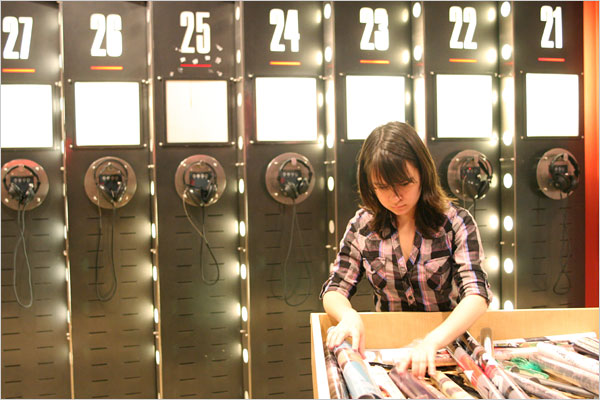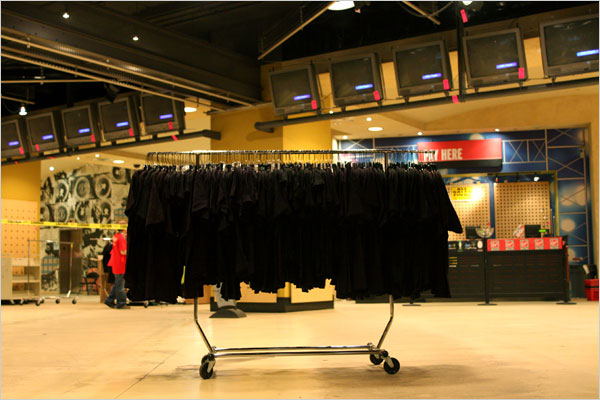By guest correspondent Troy Cooper
One of the consistent visual conventions of the current economic recession is the photograph of a store closing. Any number of major retailers have announced their intent to shut the doors at many or all locations, and the conventional image often accompanies such news. Record stores, due to a number of factors, not the least of which is the popularity and availability of digital music, have been phasing out over the past decade. So the demise of another one might not be surprising, but the closing of a music megastore suggests that more can be involved than discounts and shuttered windows.
With the closing of the Virgin Megastore in New York City comes a ritual normally relegated to human loss. In the store’s last days, we bear witness to death, loss, and mourning.

In a space where one would aurally browse the latest albums now resides a repetitive emptiness, as if each of these stations is an individually numbered victim of the downturn. One might even envision the cold steel drawers of the morgue in this photo, numbered to identify the dead. The young woman in the photograph stares dismally into the poster bin, as if in mourning of the loss behind her. Perhaps she is there to identify a fallen loved one. No longer do consumers share in the experience of new music side by side in the store; instead, scavengers pick through the detritus that remains.

Here, amid the vast emptiness of the retail floor, exists a lone rack of black Virgin-branded t-shirts, one of the last remnants of the megastore’s inventory. The composition of this image is notable. The image of a gurney or a casket comes to mind, as the shape of the rack on wheels centers the image; the blackened televisions above suggest flatlined heart monitors. The deceased is prepared for transport to the cemetery. The recession has claimed a mega-victim.
Yet, what is it about the death of the megastore that gives us cause to mourn? Our investment in consumerism is intimately tied with civic responsibility. It is the consumer-citizen’s responsibility to tend to the dying industry, for without her attention, its lifeblood is drained. Despite one’s best efforts to the contrary, we are all part of consumer culture. Our roles in the culture may differ, but our commitment to capital remains constant. While some may applaud the death of a megastore, others lament. We all have our ways of mourning.
Interestingly, in this particular case of the store-closing photograph, we are provided a glimpse of the store’s last days. We are allowed to witness the slow and steady death of the retail chain; perhaps we are also called to witness the death of an industry. More importantly, we are privy to the mourning process; we see human grief for the loss of commerce, exchange, goods often enjoyed in common. The photographs ask us to consider the utility of the megastore in troubled economic times, our reactions to various effects of economic recession, and our personal relationships to consumerism.
Photograph by Jessica Ebelhar/The New York Times.
Troy Cooper is a Ph.D. Candidate in the Dept. of Communication at the University of Illinois, Urbana-Champaign. His dissertation examines the visual rhetoric of consumer activism during the rise of modern advertising in the United States. Troy can be contacted at tcooper2@illinois.edu.
[…] No Caption Needed examines photos of the death of the Virgin Megastore in New York: More importantly, we are privy to […]
[…] By guest correspondent Troy Cooper One of the consistent visual conventions of the current economic recession is the photograph of a store closing. Any number of major retailers have announced their intent to shut the doors at many or all locations, and the conventional image often accompanies such news. Record stores, due to a number of factors, not the least of which is the popularity and availability of digital music, have been phasing out over the past decade. So the demise of another See more here: Death and Mourning in Retail […]